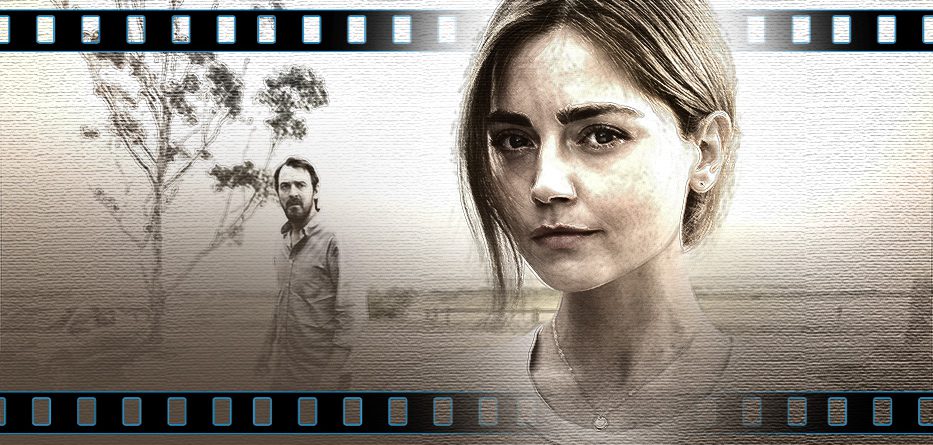Primary school teacher Joanna (Jenna Coleman) meets driven political aide Alistair (Ewen Leslie) and they become involved, Joanna learning too late that Alistair has a wife and child, though he insists the marriage is as good as over. His wife Alexandra (Asher Keddie) takes their teenage daughter Chloe (Markella Kavenagh) back to her native Australia, while Joanna and Alistair have a child of their own, baby Noah. But Alistair is desperate to see more of Chloe and decides to sue for full custody, but that means going to Australia to initiate proceedings.
Already tired and stressed and often left alone by Alistair, Joanna reluctantly but supportively agrees to travel with him to Australia, enduring a nightmare trip that leaves her physically and emotionally more tired than ever. But the nightmare is just beginning, because one night, in a small coastal town near Melbourne, young Noah goes missing from their car and Joanna’s world begins to disintegrate…
There’s an achingly on-the-nose scene aboard a plane in the BBC‘s The Cry where Coleman’s Joanna can’t get her young one to rest and she, the fellow passengers and even the crew grow more and more exasperated. It will likely strike a chord with parents and non-parents alike.
Last year, while travelling to Los Angeles with all the weariness and anxiety that long plane-rides inevitably create, I found myself sat in a departure lounge waiting for a delayed connection and facing not just the need to keep checking I had my travel documents to hand every five minutes but growing increasingly frustrated that a few feet away was a screaming infant and mother who seemed unable to calm it. For the love of Quantas, I was thinking, could someone find a way to calm things down???? And then in what I can only describe as some sort of epiphany or basic common-decency light-bulb moment, it occurred to me that the woman and the baby weren’t the problem – or, at very least, that I could and should be part of the solution by simply asking if I could help someone who was clearly getting overwhelmed. An airline attendant stepped in to help before I could get up, but it brought in to sharp focus that we tend to forget or set aside other’s greater trials and tribulations when they’re even slightly inconvenient.
The Cry takes over the spot recently held by Bodyguard, a mixed-blessing task given the unexpectedly long ratings-busting shadow that cast. Though there’s no doubt that there are a raft of excellent performances – not least from a devastatingly believable and believably devastated Jenna Coleman – and a compelling mystery at its heart, executed in suitably mercurial style with shifting time-frames and editing – the question may still be whether audiences will stick with the series when it channels the perils of post-partum depression quite so vividly. While Bodyguard had you on the edge of your seat and munching on popcorn, The Cry will likely have you curled into the couch with a cushion held tightly around you and a bottle of Valium on stand-by.
On one level, The Cry is effective and even educational, a tour-de-force in emotional drama that you experience rather than being entertained. It’s a valid, important and timely addition to the #metoo message, one that talks not of physical abuse but of emotional neglect on an individual and society-level stage and cloaks it in a mystery that flashes backwards and forwards along a timeline, dropping clues and isolated moments but few answers in its first hour. The flashing backwards and forwards works for and against the production – it allows for drama as we slowly begin to piece together elements into some sort of chronological order and there’s a clever mix of comparison shots (empty to full rooms, domestic angst to carefully-manicured image-building and vice versa). The geographical shifts are also well handled, the dirty sterile but damp blues of urban Scotland at immediate contrast with the brighter, dry Australian hues.
Yes, you’ll want to know the details of baby Noah’s fate, you’ll mutter and grumble at Alistair’s devastating lack of co-parenting skills and you’ll track your shifting allegiances and sympathies regarding Joanna as you consider her as victim and/or perpetrator at any given moment. But there’s an irony that a such a study of sorrow is like the unspoken truth of real grief itself – that it’s an emotion for which a part of you wants to offer sympathy and assistance – but which can also have another, opposite, less acknowledged reaction: that it may make you retreat ever so slightly from those suffering, as if that continuing cloud of depression was contagious if you were to be in its presence too long. It mercilessly, irrationally isolates in both directions. Subsequently, childless viewers will be exhausted watching the rollercoaster of primal emotions and new parents will nod sagely at the primal stresses of dealing with a new child and be glad they aren’t alone, but may also not wish to spend what little downtime they have with more colic and swaddling.
“Do you think you will cry?” Alistair asks with a certain cold ambiguity as they get ready to appear on a television appeal.
It’s likely, as a viewer, you will… but The Cry‘s run of four episodes is probably enough vicarious sorrow…
The Cry is currently showing on the BBC, Sunday nights…

- Story9
- Pacing8
- Direction9
- Acting9








